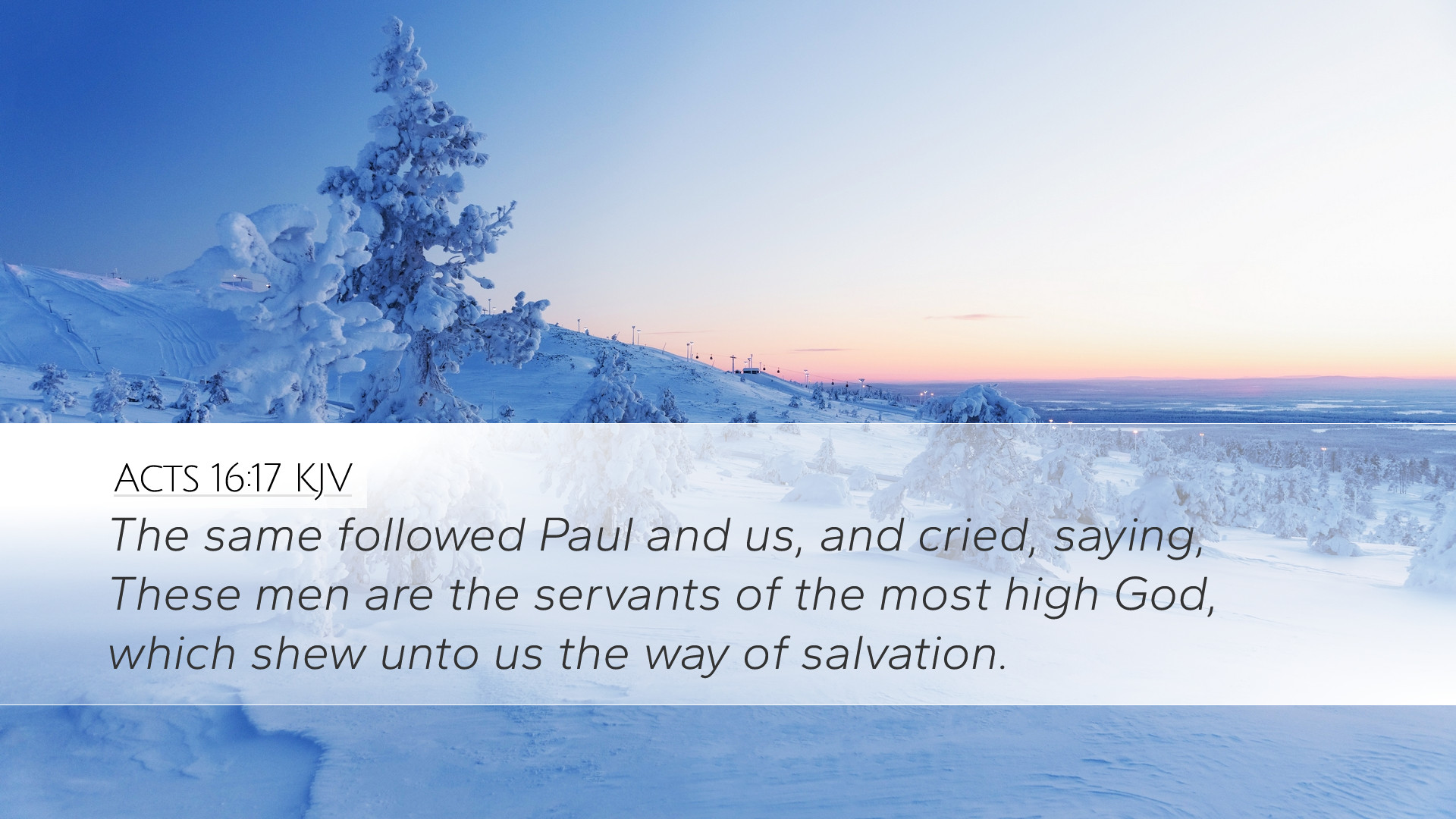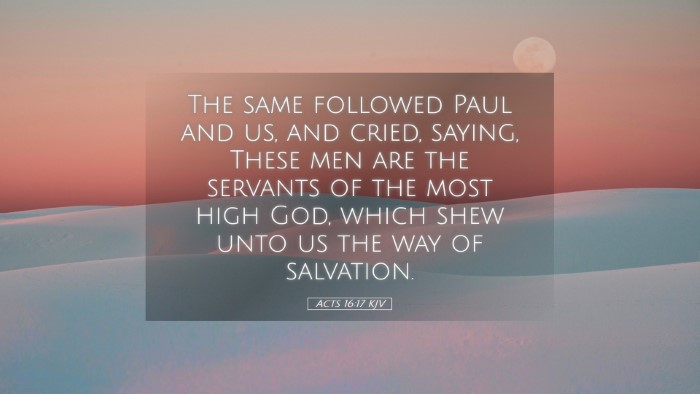Acts 16:17 (KJV): "The same followed Paul and us, and cried, saying, These men are the servants of the most high God, which shew unto us the way of salvation."
Exegesis and Context
The context of Acts 16:17 is essential for understanding the significance of the events taking place. Paul and his companions, including Silas and Luke, were on a missionary journey in Philippi, a prominent city of Macedonia. This verse introduces a unique character, a girl possessed by a spirit of divination, who was a slave and earned much profit for her masters through her fortune-telling.
Luke, the author of Acts, chronicles the early church’s growth and the challenges faced by its leaders. The journey into Europe marked a significant turning point in the spread of the Gospel, highlighting the role of the Holy Spirit in guiding the ministry of Paul.
Commentary Insights
-
Matthew Henry:
Matthew Henry emphasizes the irony present in the girl's proclamation. Although she speaks the truth regarding Paul and his associates being servants of the Most High God, she is under the influence of a demon. This serves to illustrate how the enemy can sometimes appear to endorse the truth while simultaneously working against it. Henry points out that the recognition of the servants of God by an evil spirit highlights the spiritual battle inherent in evangelism.
-
Albert Barnes:
Barnes notes that the girl's public declaration could be seen as a form of advertisement for Paul and his teaching, yet it also posed a potential danger. Despite the truth in her proclamation, he was wary of the demonic source of her utterance. He argues that this situation underscores the need for discernment amongst believers, as the source of truth must always be verified against its alignment with God’s will.
-
Adam Clarke:
Clarke elaborates on the nature of the spirit that possessed the girl. He offers cultural and historical context, explaining that the girl was likely exploited due to her condition, reflecting societal injustice. Clarke also emphasizes the importance of recognizing that even a demonic spirit can proclaim the truth, underscoring a vital principle in spiritual warfare: not everything that seems to affirm the truth is aligned with God’s purpose and plans.
Theological Implications
This passage raises significant theological questions regarding the nature of truth and the role of the demonic in proclaiming it. Paul’s experience with the slave girl illustrates the complex relationship between truth and deception. The recognition of God's servants by a demonic entity emphasizes that truth can be acknowledged even by those who oppose it.
The interaction invites reflection on the broader themes of spiritual discernment and the nature of divine authority. It is crucial for believers to grasp that recognition from non-believers or even demonic forces does not equate to divine endorsement. Acts 16:17 stands as a reminder of the necessity of grounding ministry in the truth revealed in Scripture, rather than in the affirmation of others, even if they articulate truths about God.
Practical Applications
From Acts 16:17, several practical applications arise for modern believers:
- Discernment: Believers are called to develop spiritual discernment, recognizing the source of the messages they encounter. Leaders, particularly, must be vigilant against false endorsements or teachings that carry a semblance of truth but are ultimately deceptive.
- Boldness in Witness: Just as Paul continued to minister despite opposition and peculiar circumstances, modern Christians are encouraged to preach the Gospel boldly, trusting in God’s protection and guidance.
- Awareness of Spiritual Warfare: The account in Acts serves as a reminder of the spiritual warfare that accompanies evangelism. It suggests that believers must be prepared to combat spiritual opposition while remaining committed to spreading the truth of salvation through Christ.
- Compassion for the Oppressed: The plight of the young girl highlights the need for compassion towards those in bondage, whether physical, emotional, or spiritual. Believers are urged to advocate for justice and assistance for the oppressed members of society.
Summary and Conclusion
Acts 16:17 provides rich insights into the nature of truth, spiritual authority, and the complexities of human interactions within spiritual contexts. The acknowledgment of Paul and his companions as servants of the "Most High God" amid a demonic proclamation serves to highlight the profound intricacies of spiritual warfare that believers face.
Understanding this passage through the lenses of public domain commentaries encourages a deeper theological reflection on the nature of truth, discernment in ministry, and the compassionate response needed towards those ensnared in darkness. In recognizing the challenges presented in this verse, pastors, students, and theologians can draw valuable lessons applicable to contemporary ministry practices as they seek to advance the kingdom of God amidst spiritual opposition.


